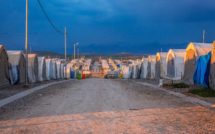

This is part of our special feature The Gender of Power.
In the spring of 2013, during my first weeks of ethnographic and interview-based research on the French National Front (FN), I visited the FN headquarters in the city of Nice. There were only men at the permanence that day, mostly retirees who had volunteered to do small office tasks for organizing the 2014 municipal electoral lists. They were largely the “classic” petty bourgeois activists who had joined the party in the 1980s when Jean-Marie Le Pen was party president. During our conversations, I immediately encountered several themes that I would continue hearing for the next four years. Interspersed with discussion around France’s “immigration problem,” anti-Muslim sentiment, and harsh critiques of political elites and Euro-crats, the men frequently spoke of their love for Marine Le Pen. The older men remembered her as the daughter who attended party events as a child and then as a young woman. Several admiringly spoke of her looks. In later interviews with young adherents, they also spoke of Marine Le Pen with love and admiration, and revered her for her courage as a twice-divorced mother and career woman who has dedicated her whole life to France. Some also spoke of her as more “virile” than most other male politicians.
Why would FN members link such narratives of Marine Le Pen’s feminine and masculine virtues alongside their virulent criticism of the European Union, Muslim immigrants, and political elites? How is a woman who is viewed as the beloved political daughter, the quintessential femme moderne, and at the same time as the new Charles de Gaulle, treated as the most potent cure to France’s political and economic woes? Why, in sum, do populist supporters emphasize such gendered virtues in their everyday discourses around their beloved leader?
For reasons that hardly need explanation, scholars are increasingly turning their attention to studying contemporary populism. Most agree that populist radical right-wing (PRR) parties in Europe are characterized by their anti-establishment rhetoric, and their appeal to “the people,” where the people are equated with an ethno-national body. Benjamin Moffitt and Simon Tormey add that populist leaders’ stylistic repertoires are distinct in their performance of “bad manners,” and in the strong affective relations they produce between leader and followers (2014). New media technologies are enhancing the electoral payoff of outlandish behavior, and can produce an everyday feeling of intimate relations with a populist leader.
Feminists have been working to “gender” such studies by following the policy platforms of PRR parties and their respective approaches to gender and sexual equality (e.g. Meret and Siim 2013; Norocel 2010). Concepts such as femonationalism (Farris 2017) or homonationalism (Puar 2007) capture how liberal ideals have been appropriated by some PRR parties, several of which call for limiting Muslim immigration in the name of protecting gender equality and LGBTQ rights. Other scholars have rather been following the gender gap in voting patterns for, and membership within, PRR parties (e.g. Mayer 2015). Some are also looking at the sexual division of labor among party activists and how PRR rank and file members understand their activism and political commitments through a gendered lens (e.g. Scrinzi 2014).
I argue that we need to go even further in placing gender analysis at the very center of the study of populism. We need to leave behind the additive formulation of “gender and populism,” and rather comprehend that there is no populism without gender. In order to try and substantiate this claim, I will take a somewhat circuitous route back to Max Weber’s original conceptualization of types of legitimate authority, and then make another stop at sociological theories of hegemonic masculinity and gender hegemony in order to argue that populism is an exaggerated and quasi-bureaucratized articulation of gender hegemony. I will provide some evidence from my four years of ethnographic and interview-based research on the French National Front to suggest that Marine Le Pen’s legitimacy amongst party adherents is rooted in their view of her as embodying hegemonic femininity and hegemonic masculinity. Hegemonic masculinity is clearly the repertoire performed by male figures such as Viktor Orbán and Donald Trump. Yet, gender-hegemonic charisma is so institutionalized as populism’s expected performative framework, that a woman populist can embody both hegemonic masculinity and femininity.
From Charisma to Gender Hegemony to Gender-Hegemonic Charisma:
At the center of a populist movement or party stands the strong leader who evokes strong feelings. But what is the nature of this “strength?” How exactly does such a leader evoke intense feelings of loyalty? In Weberian terms, what is the source of that person’s legitimate authority among her or his followers? I argue that it is not exactly charisma in Weber’s sense, but what I term “gender-hegemonic charisma,” which structures modern populism.
In Weber’s classic categorization of three forms of legitimate authority (traditional, charismatic, rational-bureaucratic), charismatic authority was the least sociologically structured form of legitimate authority. It was a quality, according to Weber, which inhered in the person who carried it, flowing from a personal strength which a charismatic leader could prove over and over again (1978). The charismatic hero must with some regularity, or at least reliability, work miracles to maintain authority, therefore rendering charismatic authority notoriously unstable and difficult to routinize.
Yet, according to Weber, patriarchal (traditional) authority also rested on the personal authority of a “natural” leader, and a strong personal devotion to that person. Unlike the extraordinary nature of charisma, patriarchal rule was a routinized and highly codified form of authority based on the rule of the father (i.e. the patriarch) as the bearer of norms and codified through tradition. Julia Adams productively clarifies the symbolic patriarchalism at the heart of patrimonialism (2005). The sign of “political fatherhood” was a glue distributing relations of rule and subordination outwards from the king, to ruling families and elites, to the ruled, a symbol which lent stability over centuries and still present in some parts of the world. Weber saw both charisma and patrimonial authority as having been, if not entirely displaced, then largely eclipsed, by modern rational-bureaucratic authority in the modern West (but see Geva 2011, 2013, 2014, 2015 for a critique of this thesis).
The eclipse of father-rule invested in the body of the king gave way to a different form of gendered power. Most of us in what we would call today the Global North no longer live in a political system clearly anchored in the patrimonial rule of the father or occasional mother, and many of us do not believe in magic. According to Raweyn Connell, we live in an era of hegemonic masculinity (1995) and its own symbolic glue. I argue that the concept of hegemonic masculinity, and the broadening of this term to that of “gender hegemony,” is a significant source of modern political authority. I will not try to elaborate here upon its relationship to modern bureaucratic authority. However, I do argue that hegemonic masculinity and gender hegemony are key concepts for understanding the sources of strong personal devotion to an individual leader. A colourful performance of gender hegemony is a constitutive feature of populism. Its symbolism and the powerful feeling it evokes are the bases of its legitimacy.
Raewyn Connell and James W. Messerschmidt’s account of hegemonic masculinity outlines how hegemonic masculinity legitimates male dominance, not only over and above femininity, but equally important, over and above subordinate masculinities (2005). American sociologist Mimi Schippers brilliantly enriches Connell and Messerschdmit’s work by arguing that gender hegemony must not only consider hierarchies between masculinities, and of masculinity over femininity, but also between femininities. Hegemonic femininity likewise perpetuates the dominance of masculinity over femininity. From Mimi Schippers’ sociological account of what she calls “gender hegemony,” we can understand that “idealized features of masculinity and femininity as complementary and hierarchical provide a rationale for social relations at all levels of social organization from the self, to interaction, to institutional structures, to global relations of domination” (2007, p. 91).
Schippers thus argues that gender qualities are constructed around the idealized relationship between masculinity and femininity, where the two are structured as complementary, two “opposites,” which are also hierarchical. Hegemonic masculinity is expressed in quality contents such as authority, physical strength, and desire for the feminine object. Hegemonic femininity is expressed in quality contents that support hegemonic masculinity as complementary to, and over and above hegemonic femininity. For example, these include qualities such as demure physicality, passive desire for the masculine object, and emotional vulnerability. Another category Schippers introduces is that of “pariah femininity.” This is a form of femininity that is socially undesirable and contaminates the clear hierarchical and complementary relation between hegemonic masculinity and femininity. It is embodied by figures such as the “butch,” the “bitch,” the “slut,” or a “pushy woman.” Pariah femininity contains the quality content of what should otherwise be the quality content of hegemonic masculinity.
To return to Weber, he emphasized that charisma rests on a performance that defies norms. Populists certainly revel in doing unusual things. But, we can hardly say that they are constantly performing magic. Rather, populists only appear to defy norms. Populists especially make discursive claims to be defying politics as usual. Yet populism is, in fact, highly structured. It is a dramatic performance of gender hegemony, quasi-routinized through a bureaucratic party structure.[1] Whether it is today’s male populists, such as Donald Trump, Viktor Orbán, Geert Wilders, and Jean-Luc Mélenchon; or women populists, such as Marine Le Pen, Sarah Palin, Pia Kjærsgaard, and Frauke Petry, all claim to be defying rational-bureaucratic norms, while at the same time, the strong feelings they invoke amongst adherents rest on highly normative articulations of gender hegemony.
More mainstream politicians adopt the trappings of rational-bureaucratic careers as the basis of their political legitimacy. That does not mean that they do not benefit from, or pay a price for, gender hegemony. However, the distinct characteristic of populist politicians is that they stage extreme repertoires of gender hegemony putatively untethered by the dampening effect of rational-bureaucratic authority. Their performances rest on a rich symbolic configuration which, through gender hegemony’s deep and extensive structuring of power and desire, evokes intense cathectic relations (emotional attachments) from their followers.
The French National Front: Some Insights from Within
During four years of research, I have encountered multiple gendered themes permeating National Front activists’ expressions of support and admiration for Marine Le Pen. Several of these emphasize Marine Le Pen’s hegemonic femininity, whereas others emphasize her hegemonic masculinity, akin to that of her father, Jean-Marie Le Pen. Older adherents tend to see Marine Le Pen as a political daughter who is a true daughter of the party, and a daughter of France. Their emotional investment in Jean-Marie Le Pen’s hegemonic masculinity transfigured into an acceptance of Marine Le Pen as the prodigal daughter. She is associated with historic figures such as Joan of Arc, and in the words of one female FN politician who is Marine Le Pen’s age, she “carries the party’s history in her guts.”
Others, especially young adherents, described Marine Le Pen as a feminine symbol of the future. They highlighted how Marine Le Pen cares for her party as she does for her children, and understands the challenges facing the young. Some male adherents sexualized Marine Le Pen, even in public fora—such as a speech I witnessed in February 2017, during Marine Le Pen’s presidential campaign kickoff in Lyon, when a senior male FN politician told an audience of thousands that when Marine Le Pen asked him to advise her on her presidential campaign, he went home and thought about it all night, “a beautiful night with Marine.” The crowd, and Marine Le Pen, giggled in delight. A major political gathering was taken as an opportunity to collectively celebrate her embodiment of hegemonic femininity.
Others also commented on Marine Le Pen’s masculine virtues. Yet, remarkably, supporters did not express to me views of her as embodying pariah femininity. Although she could be seen as virile, a “big woman,” “almost like a man,” authoritative with a deep voice, “her father’s son,” or embodying the spirit of Charles de Gaulle or Napoleon Bonaparte, these qualities only served to legitimate her standing among adherents. They did not see her as embodying polluted pariah femininity. If at all, it was her critics who suggested she was a witch, a bitch, or Jean-Marie Le Pen with longer dyed-blonde hair.
The performance and meanings associated with gender-hegemonic charisma are structured so that a woman populist can simultaneously embody both roles. By contrast, a male populist can only afford to embody hegemonic masculinity. The specific repertoires of hegemonic masculinity available to men differ across the political divide. Donald Trump performs virile and predatory machismo; Bernie Sanders is a caring grandfather; and Jean-Luc Mélénchon is the Latin American guerilla warrior. But in all cases, these are expressions of gender-hegemonic charisma.
Seen from within and below, Marine Le Pen’s political virtues are not strictly appreciated by FN loyalists in terms of her policy views on issues like immigration or the European Union. Rather, in their everyday discourse, support for Marine Le Pen is expressed through masculine- and feminine-typed virtues; both hegemonic femininity and hegemonic masculinity. One cannot artificially parse out supporters’ “real” interests and substantive policy views from their appreciation of her gendered virtues. We therefore need to bury the “populism and gender” formulation. There is no populism without gender.
Dorit Geva is Associate Professor in the Department of Sociology and Social Anthropology at Central European University, and is currently a EURIAS Fellow at the Collegium de Lyon. She has been studying the French National Front and its gender politics since 2013, considering how it reflects upon current understandings of Bonapartism, patrimonialism, post-colonial racial politics, and populism.
Photo: Maine Le Pen, from the Front National, meeting for the presidential election of 2017 at the Zenith of Paris, Frederic Legrand – COMEO | Shutterstock
References:
Adams, Julia. 2005. “The Rule of the Father: Patriarchy and Patrimonialism in Early Modern Europe,” pp. 237-266 in C. Camic, P. S. Gorski and D. M. Trubek (eds.), Max Weber’s Economy and Society: A Critical Companion. Stanford, CA: Stanford University Press.
Connell, R.W. 1995. Masculinities. Berkeley: University of California Press.
Connell, R.W. and James W. Messerschmidt. 2005. “Hegemonic Masculinity: Rethinking the Concept.” Gender and Society 19 (6): 829-859.
Farris, Sara R. 2017. In the Name of Women’s Rights: The Rise of Femonationalism. Duke University Press.
Geva, Dorit. 2011. “Where the State Feared to Tread: Conscription and Local Patriarchalism in Modern France.” In The Power of Kinship: Patrimonial States in Global Perspective, edited by Julia Adams and Mounira Charrad. The Annals of the American Academy of Political and Social Science, Vol. 636, 1, pp. 111-128.
Geva, Dorit. 2013. Conscription, Family, and the Modern State: A Comparative Study of France and the United States. Cambridge University Press.
Geva, Dorit. 2014. “Of Bellicists and Feminists: French Conscription, Total War, and the Gender Contradictions of the State.” Politics and Society, Vol. 42, 2, pp. 135-165.
Geva, Dorit. 2015. “Selective Service, the Gender-Ordered Family, and the Rational Informality of the American State.” American Journal of Sociology, Vol. 121, 1 (July): 171-204.
Mayer, Nonna (2015) “The Closing of the Radical Right Gender Gap in France?” French Politics 13(4): 391-414.
Meret, Susi. 2015. “Charismatic Female Leadership and Gender: Pia Kjærsgaard and the Danish People’s Party.” Patterns of Prejudice 49(1-2): 81-102.
Meret, Susi and Birte Siim. 2013. “Gender, Populism and Politics of Belonging: Discourses of Right-Wing Populist Parties in Denmark, Norway and Austria,” pp. 78-96 in B. Siim & M. Mokre (eds.), Negotiating Gender and Diversity in an Emergent European Public Sphere. Basingstoke: Palgrave Macmillan.
Moffitt, Benjamin, and Simon Tormey. 2014. “Rethinking Populism: Politics, Mediatisation and Political Style.” Political Studies 62(2): 381–97.
Norocel, Ov Cristian. 2010. ‘Constructing Radical Right Populist Resistance: Metaphors of Heterosexist Masculinities and the Family Question in Sweden.” Nordic Journal of Masculinity Studies (NORMA), 52): 167-83.
Puar, Jasbir K. 2007. Terrorist Assemblages. Homonationalism in Queer Times. Duke University Press
Schippers, Mimi. 2007. “Recovering the Feminine Other: Masculinity, Femininity, and Gender Hegemony.” Theory and Society 36(1): 85-102.
Scrinzi, Francesca (2014). “Caring for the Nation: Men and Women Activists in Radical Right Populist Parties 2012-2014. Final Research Report to European Research Council.” Project Report.
Weber, Max. 1978 [1922]. Economy and Society. Berkeley: University of California Press.
[1] The relation to a bureaucratized party structure admittedly needs significantly more development in my argument.
Published on July 6, 2017.




